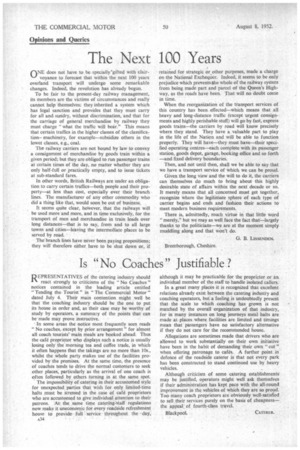The Next 100 Years
Page 52

If you've noticed an error in this article please click here to report it so we can fix it.
QNE does not have to be .speciallytgifted with tlairvoyance to forecast that within the next 100 years overland transport will undergo some remarkable changes. Indeed, the revolution has already begun.
To be fair to the present-day railway management, its members are the victims of circumstances and really cannot help themselves: they inherited a system which has legal sanction and provides that they must carry for all and sundry, without discrimination, and that for the carriage of general merchandise by railway they must charge "what the traffic will bear." This means that certain traffics in the higher classes of the classification— machinery, for example—subsidize others in the lowet classes, e.g., coal.
The railway carriers are not bound by law to convey a consignment of merchandise by goods train within a given period; but they are obliged to run passenger trains at certain times of the day, no matter whether they are only half-full or practically empty, and to issue tickets at sub-standard fares.
In other words, British Railways are under an obligation to carry certain traffics—both people and their property—at less than cost, especially over their branch lines. The manufacturer of any other commodity who did a thing like that, would soon be out of business.
It seems quite clear, however, that the railways will be used more and more, and in time exclusively, for the transport of men and merchandise in train loads over long distances—that is to say, from and to all large towns and cities—leaving the intermediate places to be served by road.
The branch lines have never been paying propositions; they will therefore either, have to be shut down or, if
retained for strategic or other purposes, made a charge on the National Exchequer. Indeed, it seems to be only prejudice which prevents the whole of the railway system from being made part and parcel of the Queen's Highway, as the roads have been. That will no doubt come in time.
When the reorganization of the transport services of this country has been effected—which means that all heavy and long-distance traffic (except urgent consignments and highly perishable stuff) will go by fast, express goods trains—the carriers by road will know precisely where they stand. They have a valuable part to play in the life of the Nation and will be able to function properly. They will have—they must have—their specified operating centres—each complete with its passenger station, goods depot, garage, booking office and so forth —and fixed delivery boundaries.
Then, and not until then, shall we be able to say that we have a transport service of which we can be proud.
Given the long view and the will to do it, the carriers can themselves do much to bring about this highly desirable state of affairs within the next decade or so. It merely means that all concerned must get together, recognize where the legitimate sphere of each type of carrier begins and ends and fashion their actions to meet modern business requirements.
There is, admittedly, much virtue in that little word "merely," but we may as well face the fact that—largely thanks to the politicians—we are at the moment simply muddling along and that won't do.
G. B. L1SSENDEN.
Bromborough, Cheshire.




















































































